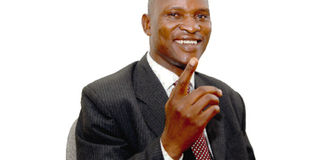Prime
The President’s man

Tamale Mirundi tells Emmanuel Makeri of how he matured from a nosy village boy to a newspaper vendor and eventually a senior presidential press secretary.
There is no self-realisation that comes easy; even the small nut seed has to hold its ground to become a great oak tree. With his proverbial wit, eloquence and sarcastic tone, Tamale Mirundi tells how he matured from a nosy village boy to a senior presidential press secretary.
Born in November 1964 to the late John Tamale and Molly Namatovu in a family of 11 children, Mirundi is the ninth. When I met him, he spoke fondly of his childhood.
“I grew up in Matale, a small village in Rakai district. Though it was violent, dusty and ghostly, this village’s influence on my thinking and political perception still holds even today. In Matale, we had all types of people; resilient farmers, witchdoctors, cannibals and intellectuals like my father. He was like the village lawyer; villagers used to flock our home to see him for advice and that made me proud. This feeling instilled in me the hunger for knowledge. I wanted to be like him - informed and smart.
“We also had witchdoctors who inflicted spells on people. This taught me to be disciplined. I could never abuse an elder or steal mangos because this could get you bewitched. And we had cannibals. These things have strengthened my nerves. We had a man called Nsuwa who became famous in the village because of his fearless verbal utterances on Mengo politics.
This is when my interest in Mengo started. I admired his courage in taking on Kabaka Yekka despite the fact that he was a mere passionate local DP activist. I figured out that if I became as passionate as he was and as informed as my father, I would make a potent intellectual.” As he completed this sentence, Mirundi patted my shoulder before moving towards his office door and receiving documents from his secretary. He seemed lively, playful and a bit informal in his gesticulations.
He proceeded abruptly, “When war broke out in 1979, I moved to Kampala to stay with my brother and joined Rubaga S.S.S. I was fresh from the village, so I was a bit reserved, but was quick to adapt to city life. In my S.2, I started vending Munno newspapers on Kampala streets. This made me more knowledgeable because I read these newspapers as I sold them. As a young man, I contributed political articles to the Munno publication and this gave me the confidence to start up my own two newspapers in the early 1990s. Lipoota was a Luganda daily and The Voice was an English weekly. By that time, I only had a diploma in Mass Communication.”
Almost reflexively, he switched facial expression from a buoyant to a cool reflective one. “When the NRM government came into power, we thought it was bringing communism to Uganda and wouldn’t create a free press environment, so I became vocal in the opposition. At that time, the government also realised the power and influence the media was gaining so they passed a law that every newspaper editor had to have a degree. The president realised that if the media was in the hands of illiterate people, it would brew trouble for him.Because I only held a diploma, I couldn’t edit my newspaper personally. I decided to go back to university. This was my turning point.” He went to Makerere University to study Political Science. We spoke like comrades, joked and laughed about his pathetic situation then.
“We were mature family men and the young lecturers used to tease us by throwing provocative comments in the lecture rooms. By the time I finished my degree, William Pike had already taken over the market with The New Vision. He came with colour printing and sophisticated distribution channels that prompted me to close my publications.” At this point, Mirundi’s tone became somewhat staccato. He spoke of the following events snappily, with little enthusiasm.
“I was one of the president’s critics and a fine journalist then. The president sensed that my criticism was constructive so he invited me to some of his trips abroad. That was rare of any president since I was writing for a private publication. With these constant interactions, I got to understand the President’s agenda for this country and through hard work, have gotten to the rank of senior presidential press secretary,” he said, smiling contentedly.
When I asked him about his family, he was quick to respond, “A Muganda man doesn’t say how many children he has but I can say that I have two wives.” After the interview, we spoke about Mengo politics and he still had much to say.




